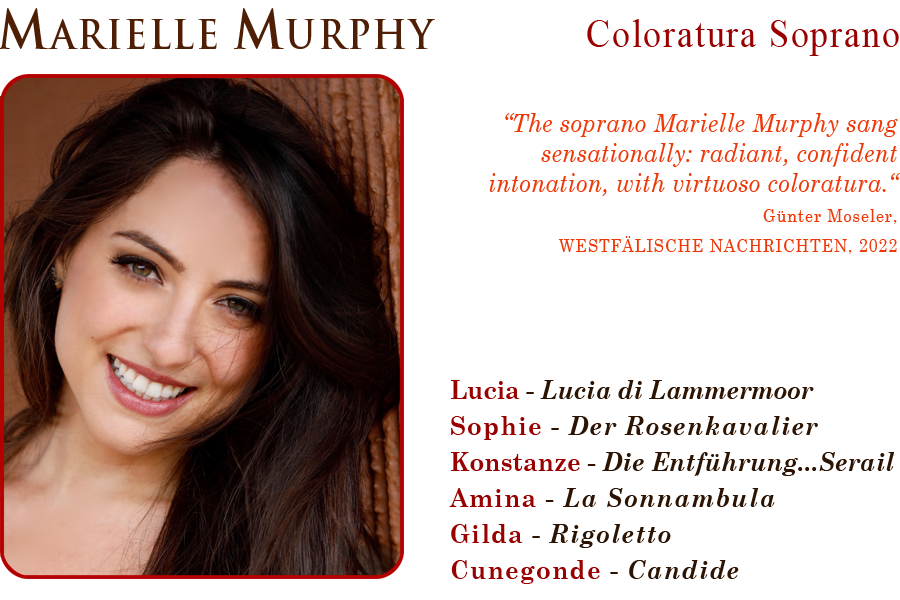“Brilliant” (The New York Times) American coloratura soprano Marielle Murphy, a native of Carmel, California, is making her mark on international operatic and concert stages. With her fearless fioritura and impeccable musicianship, she embodies the complete opera singer for today's demanding audiences.
Next season, Marielle Murphy will return to the Metropolitan Opera as a cover for Fiakermili in a new production of Arabella. In 2023, she made her thrilling Met debut as Oscar in David Alden’s production of Verdi’s Un Ballo in Maschera, stepping in at the last moment. She was subsequently added to the Metropolitan Opera roster for the 2023/24 season as a cover for Oscar. As a member of the Theater Münster ensemble (2021/2022) in her fourth season, she appeared as Cunegonde in Bernstein’s Candide and reprised her successful title role as Yolimba in Wilhelm Killmayer’s rarely performed opera. In the 2020/21 season she performed Susanna in Le Nozze di Figaro and and Gabriel/Eve in Haydn’s Die Schöpfung with Symphony Orchestra of Münster. In 2022, she performed Richard Strauss’ Brentano Lieder and Vaughan Williams’ Dona Nobis Pacem in concert with the Neue Philharmonie Westfalen, commemorating and honoring victims of war throughout history. Due to the COVID-19 pandemic, her March 2021 debut as the title role in Lucia di Lammermoor was cancelled. The 2019/20 season featured her as Oscar in Un Ballo in Maschera, the title role in Yolimba, and Madeleine in Glass' The Fall of the House of Usher. In 2019, she appeared as Michal in Händel's Saul with Theater für Niedersachsen. In concert, she sang Gabriel in Albert Lortzing’s Die Himmelfahrt Jesu Christi with the Symphony Orchestra of Münster. Read More

Yolimba's Entrance from Wilhelm Killmayer’s Yolimba (2021)

Yolimba's Opera Scene from Wilhelm Killmayer’s Yolimba (2021)


Adams |
Moore |

Bach - Magnificat, Mass in B Minor, |
Mahler - Symphony No. 4 |

“Richard Strauss’ 1918 komponierte Brentano-Lieder wirken wie ein Rückzug ins Privat-Elysium. Die Sopranistin Marielle Murphy sang sensationell: strahlend, intonationssicher, mit virtuosen Koloraturen. Sie schwelgte im Pomp des „An die Nacht“ und traf ideal den Tonfall in „Ich wollt ein Sträusslein binden“. Es ist das „Lied der Frauen“, dessen theatralisches Gespenstertreffen existenzieller Ängste von Schifferin, Bergmanns- und Soldatenfrau die Sopranistin wie authentische Stimmen sprechen ließ.”
Günter Moseler, Westfälische Nachrichten, 2022
“Das, was ich über die ersten beiden Akte von Freitag schon schrieb, gilt für die ganze Oper, dass nämlich Marielle Murphy als Susanna der Oper den Stempel aufgedrückt hat. Die Braut von Figaro singt so kraftvoll, so emotional, so wunderschön, dass ich mich selbst dabei ertappe, einfach „wegzubrezeln“, erst mit den letzten Tönen erwache ich irgendwie aus einer anderen Welt.”
Burkard Knöpker, 2020
“Marielle Murphy singt souverän die Koloraturen der Yolimba und tanzt auch noch großartig…”
Stefan Schmöke, Online Musik Magazin, 2019
“Großartig die Koloratursopranistin Marielle Murphy als Page Oscar! Da perlten die hohen bis höchsten Töne nur so aus ihr heraus. Die schwierigen Passagen und Läufe ihrer Partie schienen ihr offenbar keinerlei Mühen zu bereiten. Dazu ungemein bewegungsfreudig auf der Bühne, völlig aufgehend in ihrer Rolle. Fast ein wenig erschrocken wirkte sie, als beim Schlussapplaus ein Bravorchor über sie hineinbrach. Aber der war absolut verdient für diese außergewöhnliche Leistung! Für mich eine der überzeugendsten Oscar-Interpretationen die ich in vielen Jahren Opernerfahrung erleben durfte. Da schliesse ich mich gern dem Münsteraner Premierenpublikum an: 'Bravo!.”
Detlef Oben, Das Opernmagazin, 2019
“Marielle Murphy als seiner geliebten Konstanze lag vor allem die lyrische Arie über ihr trauriges Los. Für die Koloraturen verfügte sie über die passende Höhe und dort stimmliche Beweglichkeit…”
Sigi Brockman, Online Merker, 2019
“Namentlich genannt werden sollte Marielle Murphy als Zerbinetta, die komödiantische Gegenspielerin der Ariadne, weil Strauss ihr unglaubliche Kolleraturen abverlangt, die sie mit Geschmeidigkeit und Witz bewältigt.”
Klebers Stadtmagazin Aachen, 2017
“...Marielle Murphy (what a great coloratura voice) was one of my highlights this evening because of the sheer beauty of their voices blending together.”
The Operatic Musicologist, 2016

